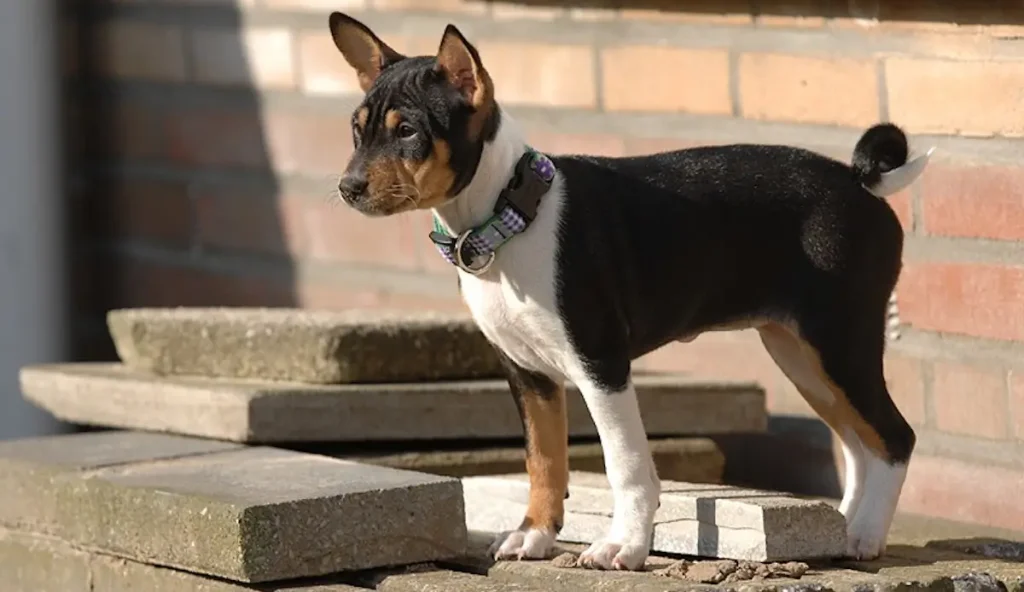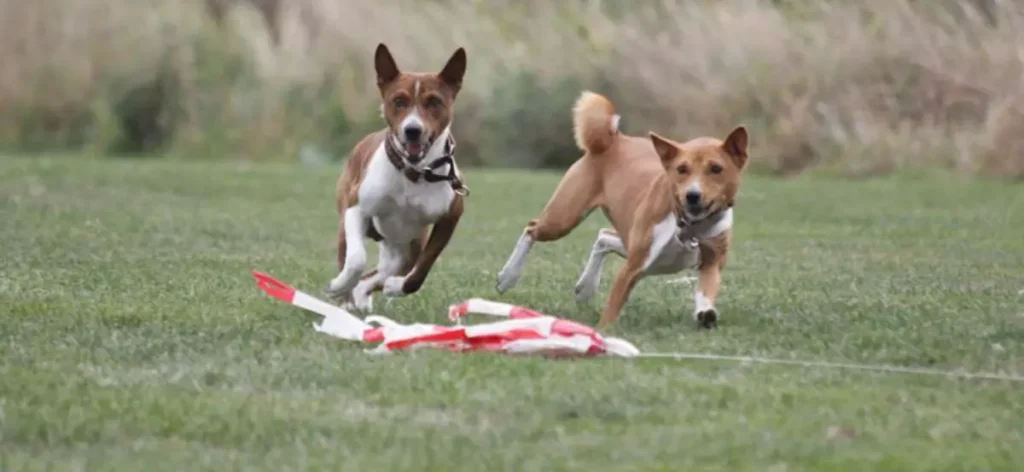Elegant in stature, distinct in demeanor, and unique in sound, the Basenji breed stands out among the canine world for reasons that will be both fascinating and mysterious.
As an owner or enthusiast, you’re likely aware of their signature trait: a remarkable barkless ‘voice’ that has earned them the nickname ‘the African barkless dog.’ Yet, their vocal repertoire extends beyond a simple lack of barking; it includes a symphony of hums, yodels, and whines that communicate much more than you might expect.
Understanding the nuances of the Basenji’s vocal expressions is key to unlocking a deeper bond with these enigmatic creatures. Just as you think you’re grasping their silent nature, they’ll surprise you with sounds reflective of their rich and storied origins.
So, what about the Basenji’s communication captivates and challenges the conventional wisdom about our four-legged companions? Let’s explore the symphony of noises that emanate from these poised pooches, and perhaps you’ll discover the unheard melodies of the dog world that resonate with the Basenji’s ancient lineage.
- Noise Level
- Energy
- Sociability
- Trainability
- Care
- Health
Overall
Summary
The Basenji breed is moderately vocal with high energy levels. They are moderately sociable and trainable, requiring moderate care and enjoying good health
Basenji: Traits, Temperament, and Care Guide
As you explore the characteristics of the Basenji, note their remarkable intelligence and independence, which can present challenges during training.
Their exercise needs are moderate, but don’t underestimate the importance of mental engagement to prevent boredom and promote their overall well-being.
Regular health check-ups are crucial, given their predisposition to certain genetic conditions, and minimal grooming is required to maintain their sleek coat.
Understanding the Unique Characteristics of Basenji
Delving into the unique characteristics of the Basenji, you’ll uncover a breed that combines the traits of a silent hunter with the cleanliness of a feline, necessitating a tailored approach to their care and training.
Esteemed as the Barkless Dog due to their unique vocalizations, their independent nature commands respect.
Careful socialization and consistent, positive training are paramount in nurturing your bond and ensuring their well-being.
Exploring the Characteristics of the Basenji
Discover the distinctive traits of the Basenji, a breed renowned for its silent demeanor and peculiar vocalizations, including a melodic yodel that sets it apart from other canines.
| Trait | Description |
|---|---|
| Barkless | Rarely barks, unique yodel |
| Physique | Small, muscular, curled tail |
| Grooming Habits | Cat-like, minimal maintenance |
| Intelligence & Need | Independent, craves activity |
| Health | Prone to specific conditions |
Basenji: A Comprehensive Profile and Guide
You’ll find the Basenji breed to be a distinctive combination of attributes. From its silent demeanor to its meticulous self-cleaning habits.
Assessing their care, you must consider their exercise needs and inherent instincts to tailor an effective training regime.
Their health profile necessitates vigilance for specific conditions, ensuring a robust plan for their well-being throughout their 12 to 16-year lifespan.
Everything You Need to Know About the Basenji
Let’s explore the Basenji, a distinctive breed renowned for its silent demeanor and elegant stature, to provide you with a thorough understanding of its characteristics and care requirements.
- Height: Males: 17 inches – Females: 16 inches
- Grooming: Low maintenance, cat-like cleaning habits
- Temperament: Intelligent, independent, affectionate with family
- Lifespan: 12-16 years
As barkless dogs, Basenjis offer unique vocalizations, enriching your life with their quiet and spirited companionship.

Discovering the Temperament of Basenji
When evaluating the temperament of the Basenji, one must consider their independent and intelligent nature, often leading them to be both self-sufficient and inquisitive.
The term ‘Basenji’ means ‘small wild thing from the bush,’ reflecting their high prey drive.
Proper early socialization is critical to manage their alertness and wariness with strangers.
Despite their autonomy, Basenjis seek connection, offering affection and spirited companionship with moderate exercise needs.
Basenji: Is It a Good Fit for Families?
When considering a Basenji for your family, it’s important to analyze their compatibility with children and home life.
Their energetic disposition meshes well with active household routines, yet their independent streak necessitates a thoughtful approach to training.
To ensure a good fit, you’ll need to balance their minimal grooming requirements against their sometimes standoffish behavior with outsiders.
Assessing Basenji’s Compatibility with Families and Kids
Considering the Basenji’s blend of intelligence, affection, and energy, this breed may be a suitable addition to a family, particularly one that leads an active lifestyle. Here are reasons why:
- Intelligent and affectionate nature makes them ideal companions.
- Energetic and playful, matching active family dynamics.
- Fiercely protective, providing a sense of security.
- Low grooming needs, easing the burden on busy families.
Basenji Apartment Living Suitability
One often overlooks the Basenji’s suitability for apartment living, yet their quiet nature and moderate need for exercise make them ideal for such environments.
These dogs groom themselves like cats, reducing upkeep. They need daily mental and physical stimulation, but their low-energy presence won’t disrupt neighbors.
Analyze their traits; you’ll find their apartment living suitability aligns with your desire for a harmonious, unobtrusive pet.
Curbing Basenji Stubbornness
You’ll find that addressing Basenji stubbornness requires a blend of consistency and positive reinforcement in your training approach.
Introduce mental challenges, such as puzzles and obedience exercises, to keep their sharp minds occupied and reduce the likelihood of boredom-induced misbehavior.
Establishing a structured routine for physical activity will help positively direct their natural energy, mitigating the potential for destructive tendencies.
Effective Training Strategies
To effectively curb the stubbornness often observed in Basenjis, it’s crucial to approach their training with patience, utilizing consistent positive reinforcement to guide their behavior.
| Strategy | Benefit | Implementation |
|---|---|---|
| Positive Reinforcement | Encourages desirable behavior | Treats, praise, affection |
| Consistent Training | Builds routine and expectations | Regular sessions, clear commands |
| Training & Socialization | Promotes adaptability and good manners | Exposure to diverse environments/people |
| Creative Engagement | Prevents boredom, increases cooperation | Varied activities, mental challenges |
| Leadership Establishment | Asserts pack hierarchy | Consistent routines, clear boundaries |
Basenji Exercise and Grooming Needs
Basenjis require a balanced physical exercise regimen and mental stimulation to maintain their health and prevent behavioral issues. They need regular exercise, including daily activities and minutes of exercise per day tailored to their energetic nature.
Grooming is minimal, with occasional brushing sufficing for their short coat.
Prioritize routine health checks to monitor for conditions like hip dysplasia, integral to their well-being.

Health Considerations for Basenji
You should be aware that Basenjis typically enjoy a lifespan of 12 to 14 years, yet they’re prone to certain genetic conditions like hypothyroidism and Fanconi syndrome.
It’s crucial to schedule regular vet check-ups and adhere to a health maintenance routine that includes a balanced diet and preventative measures against parasites.
To mitigate risks of progressive retinal atrophy and hip dysplasia, consider engaging your Basenji in daily exercise and providing mental challenges as part of their care regimen.
Common Health Issues and Lifespan
When considering a Basenji as your companion, it’s crucial to be aware that, while they generally enjoy a lifespan of 12-14 years, they’re prone to several health issues. Regular screenings for these conditions can help ensure your Basenji remains a vibrant family member for years to come.
Some of the health issues that Basenjis are prone to include hypothyroidism, Fanconi syndrome, progressive retinal atrophy, and hip dysplasia.
Hypothyroidism is when the thyroid gland does not produce enough thyroid hormone, leading to decreased metabolism and various symptoms.
Fanconi syndrome is a rare kidney disorder that affects the proximal tubules, leading to the loss of valuable nutrients, electrolytes, and other substances in the urine.
Progressive retinal atrophy is a degenerative eye disease that gradually leads to blindness. Regular eye check-ups can help detect this condition early and potentially slow its progression.
Hip dysplasia is a condition where the hip joint doesn’t develop properly, causing pain, lameness, and arthritis. Screening for hip dysplasia can help identify affected dogs and inform appropriate management and treatment plans.
Alternatives for Basenji: Unique and Independent Dog Breeds
For those who love the Basenji’s unique character and independence, these breeds also offer distinct personalities and a sense of self-reliance.
| Similar Dogs | Short Description |
|---|---|
| Shiba Inu | A small breed from Japan, known for its independence and fox-like appearance. |
| Whippet | A breed known for its speed and gentle demeanor, with a quiet and independent nature. |
| Dingo | An Australian breed known for its wild heritage and independent temperament. |
| Afghan Hound | A breed with a striking appearance and an aloof yet dignified personality. |
| Ibizan Hound | Elegant and athletic, known for its independent character and hunting ability. |
Is Basenji the Right Pet for You?
Assessing whether a Basenji aligns with your lifestyle and pet ownership experience is crucial before welcoming this energetic and independent breed into your home. You’re on the right track if you’re adept at providing consistent training and can commit to daily walks.
Consider adopting from rescue organizations to find a Basenji needing a compatible home that matches this breed’s longevity and health requirements.
Conclusion
In conclusion, the Basenji might be your match if you’re seeking a dog with unique charm.
Picture this: you come home to your Basenji’s melodious yodel, a greeting devoid of barks but rich.
However, it’s crucial to remember that this breed requires consistent training and ample exercise to thrive.
Their health needs, including regular vet checks, can’t be overlooked.
Assess if a Basenji aligns with your lifestyle before making this distinctive, barkless companion part of your family.
Frequently Asked Questions
What Is Unique About the Dog Breed Basenji?
You’ll appreciate the Basenji’s ancient lineage, pristine grooming habits, and prowess as a hunting companion. They’re distinct in their silent communication, perfect for your desire to connect with a unique, storied breed.
What Is the One Thing That a Basenji Can T Do That Other Dogs Can?
You’re exploring the barkless wonder of dogs, and the Basenji stands out. Unlike its kin, it doesn’t bark but shows ancient origins through unique vocalizations, alongside low-maintenance grooming habits fostering a sense of exclusive belonging.
What Is the Intelligence Rank of a Basenji?
Basenjis rank moderately in intelligence. Due to their independent thinking, they face training challenges. They thrive on mental stimulation, so you must engage them with patience and innovative training techniques.
Do Basenjis Make Any Noise?
You might think basenjis are silent with their barkless reputation, but they have a quiet demeanor that belies a rich vocal communication. They’re not noiseless; they express themselves in unexpectedly diverse ways.
